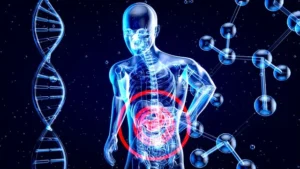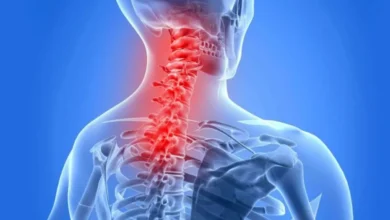
Discover common symptoms of thyroid issues, including fatigue, weight changes, hair loss, mood swings, and difficulty concentrating.Thyroid dysfunction is a prevalent condition affecting millions of people worldwide. While many are familiar with the common symptoms such as fatigue, weight gain, and hair loss, there are also unusual symptoms that may indicate an underlying thyroid problem. While many are familiar with the common Symptoms of Thyroid such as fatigue, weight gain, and hair loss, there are also unusual symptoms that may indicate an underlying thyroid problem.
What are the symptoms of thyroid ?
1.Cognitive Impairment: Brain Fog and Memory Issues
Brain fog, difficulty concentrating, and memory problems are often associated with stress or a hectic lifestyle. However, they can also be signs of an underactive or overactive thyroid. The imbalance of thyroid hormones can impact cognitive function, leading to mental confusion and forgetfulness.
2. Digestive Disturbances: Constipation and Diarrhea

Thyroid dysfunction can disrupt the normal functioning of the digestive system. Some individuals may experience chronic constipation, while others may suffer from recurring episodes of diarrhea. These digestive issues can be frustrating and may go unnoticed as potential thyroid-related symptoms.
3. Muscle and Joint Pain: Aches and Stiffness

Unexplained muscle and joint pain, along with stiffness, can be indicative of thyroid dysfunction. Individuals may experience generalized body aches or localized pain in specific areas. These Symptoms of Thyroid can significantly impact daily activities and quality of life.
4. Changes in Menstrual Cycle: Irregularities and Heavy Bleeding
Thyroid imbalances can affect hormonal regulation in the body, leading to irregular menstrual cycles. Women may experience heavier or prolonged periods, shorter cycles, or even missed periods. These changes can be a sign of an underlying thyroid issue that requires attention.
5. Skin and Hair Problems: Dryness and Brittle Nails
Dry and itchy skin, brittle nails, and hair loss are often attributed to external factors. However, these issues can also be linked to an underlying thyroid problem. Thyroid dysfunction can disrupt the normal growth and maintenance of skin, hair, and nails, causing them to become dry, brittle, and more prone to damage.
Causes of Thyroid Dysfunction
Understanding the causes of thyroid dysfunction is crucial in managing and treating the condition effectively. Some common causes include:
- Autoimmune Diseases: Conditions such as Hashimoto’s thyroiditis and Graves’ disease can trigger an autoimmune response, leading to thyroid dysfunction.
- Iodine Deficiency: Inadequate iodine intake can disrupt the production of thyroid hormones, resulting in an underactive thyroid.
- Stress and Hormonal Changes: Chronic stress and hormonal imbalances, such as those experienced during pregnancy or menopause, can impact thyroid function.
- Environmental Factors: Exposure to environmental toxins and pollutants can contribute to thyroid dysfunction.
Treatments for Thyroid Conditions
Thyroid conditions, such as hypothyroidism and hyperthyroidism, require appropriate treatment to manage symptoms and restore thyroid hormone balance. The treatment options may vary depending on the specific condition and its severity. Here are some common treatments for thyroid conditions:
Medication:

In many cases, thyroid conditions are managed with medication. For hypothyroidism (underactive thyroid), synthetic thyroid hormone replacement medication, such as levothyroxine, is prescribed to supplement the insufficient hormone levels. Hyperthyroidism (overactive thyroid) may be treated with medications that reduce the production of thyroid hormones or block their effects.
Radioactive Iodine Therapy:

This treatment is commonly used for hyperthyroidism. Radioactive iodine is taken orally, and it selectively destroys the overactive thyroid cells. This helps regulate hormone production and alleviate symptoms. However, it can lead to hypothyroidism, which requires ongoing thyroid hormone replacement therapy.
Surgery:

In certain cases, thyroid surgery may be recommended. Partial or complete removal of the thyroid gland, known as a thyroidectomy, may be performed to treat conditions like thyroid nodules, goiter, or thyroid cancer. After surgery, thyroid hormone replacement medication is usually necessary.
Lifestyle Modifications:

Healthy lifestyle habits can support overall thyroid health. This includes maintaining a balanced diet rich in nutrients like iodine, selenium, and zinc, which are essential for proper thyroid function. Regular exercise, stress management techniques, and adequate sleep are also important.
Complementary and Alternative Medicine:
Some individuals explore complementary and alternative approaches to support thyroid health. This may include practices like acupuncture, herbal remedies, Ayurvedic treatments, or dietary supplements. It is important to discuss these options with a healthcare professional before incorporating them into your treatment plan.
Regular Monitoring and Follow-up:
Once diagnosed with a thyroid condition, regular monitoring and follow-up with a healthcare professional are essential.
Causes of Thyroid Issues in Females
Thyroid issues are more prevalent in females compared to males, and several factors contribute to the development of thyroid conditions in women. Understanding the causes can help in identifying and managing thyroid issues effectively. Here are some common causes of thyroid issues in females:
- Autoimmune Diseases: The most common cause of thyroid problems in women is autoimmune diseases that affect the thyroid gland. Conditions like Hashimoto’s thyroiditis and Graves’ disease occur when the immune system mistakenly attacks the thyroid, leading to inflammation and disruption of thyroid function.
- Hormonal Changes: Fluctuations in hormone levels during various stages of a woman’s life can impact thyroid function. Pregnancy, postpartum period, and menopause are times when hormonal changes can trigger or exacerbate thyroid issues. These hormonal shifts can disrupt the delicate balance of thyroid hormones in the body.
- Iodine Deficiency: Iodine is an essential mineral required for the production of thyroid hormones. Inadequate iodine intake can lead to thyroid problems, especially in regions where iodine deficiency is prevalent. Women, particularly during pregnancy and breastfeeding, have increased iodine requirements, and insufficient intake can affect thyroid function.
- Stress and Lifestyle Factors: Chronic stress, poor sleep habits, unhealthy diet, and sedentary lifestyle can contribute to thyroid imbalances in females. Stress hormones can interfere with the conversion and utilization of thyroid hormones, impacting thyroid function.
- Genetic Factors: There is a genetic component to thyroid disorders. If there is a family history of thyroid issues, women are more likely to develop similar conditions. Genetic predisposition can increase the susceptibility to autoimmune thyroid diseases.
- Environmental Factors: Exposure to certain environmental factors can disrupt thyroid function in women. Chemicals like perchlorates, found in some drinking water sources and certain medications, can interfere with iodine absorption and affect thyroid health.
- Age: As women age, the risk of developing thyroid disorders increases. The exact reasons for this association are not fully understood, but it may be related to hormonal changes, cumulative effects of en



